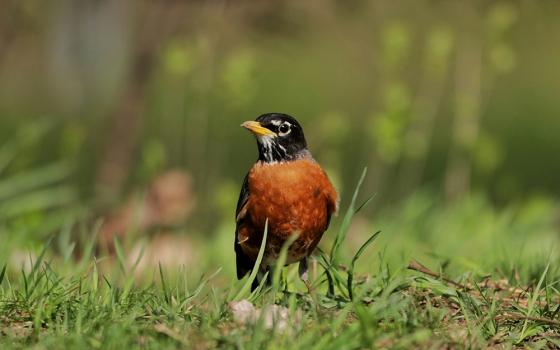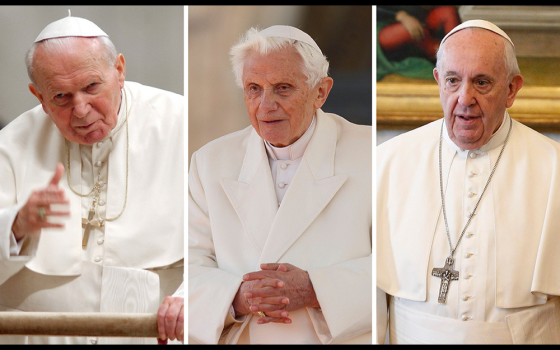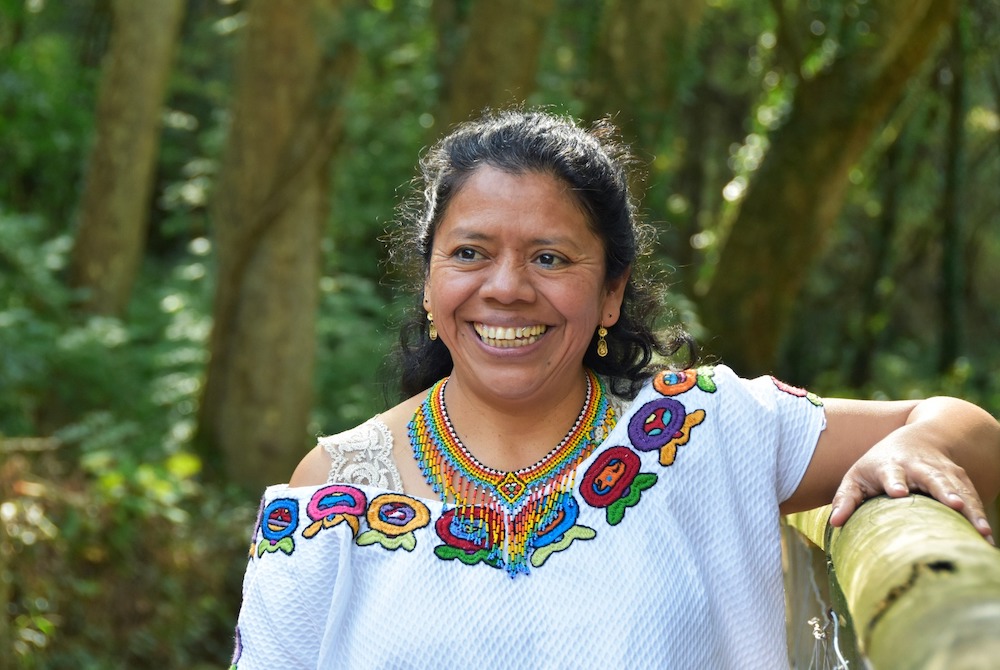
Aura Lolita Chávez Ixcaquic was one of three finalists for the European Parliament's Sakharov Prize for Freedom of Thought in 2017, the year she fled Guatemala. On April 20, she will receive the annual Romero Human Rights Award from the University of Dayton in Dayton, Ohio. (Courtesy Council of K'iche Peoples)
Editor's note: This story is also available in Spanish.
Aura Lolita Chávez Ixcaquic, a K'iche Maya teacher and community leader in Guatemala, was returning home on a bus with other women when armed men boarded the vehicle and demanded to know "Who is Lolita?" Thinking she was about to die, she was about to answer when another woman stood up and said, "I am Lolita." The men began to beat her, when another woman, and then another, said, "No, I am Lolita."
She escaped injury that day, but in 2017, she and other members of the Council of K'iche Peoples for the Defense of Life, Mother Nature, Land and Territory were attacked after stopping a truck carrying illegally cut timber. Death threats forced her to leave her country that year.
For Chávez, who lived through 24 years of civil war, the peace accords signed in Guatemala in 1996 did not end the violence. A leader in her people's struggle to defend their land against mining, dam construction and illegal logging, she has been accused of being a guerrilla and a national security threat.
On April 20, she will receive the annual Romero Human Rights Award from the University of Dayton in Dayton, Ohio.
"According to human rights reports, the highest number of killings of human rights defenders happens in Latin America," and most are murdered for their defense of environmental and indigenous rights, Shelley Inglis, executive director of the university's Human Rights Center, told EarthBeat. Chávez, she added, "reflects the spirit and the type of upstanding and human rights advocacy that is needed to really shift our society towards a more sustainable future."
The university established the award, named for St. Óscar Romero, in 2000 to honor individuals or groups who have contributed to the alleviation of suffering or injustice in the world. This year's award ceremony is part of a series of events that began March 24, focusing on environmental and climate justice.
The earliest award recipients were well-known figures, Inglis said, but more recently the university has highlighted people working at the grassroots. Chávez was one of three finalists for the European Parliament's Sakharov Prize for Freedom of Thought in 2017, the year she fled Guatemala.
She spoke with EarthBeat from an undisclosed location. The interview has been edited for brevity and clarity.
EarthBeat: What is your homeland like?
Chávez: I'm from a territory in Iximuleu, which the West calls Guatemala. The place is called Quiché. It is a region in the mountains and still has a great deal of biodiversity, although [infrastructure and other] plans and projects have been imposed there. But thanks to our cosmovision, my people — the K'iche Maya — have a lifestyle closely tied to the web of life. This enables us to maintain our ties to the land.
We plant milpa [a traditional combination of corn, beans and squash]. We are Corn People, and we are linked to food that comes from the land. Our food is produced by the community itself. The climate is neither hot nor cold, but there are microclimates, and because of that, there are different species, different animals, plants and other beings that cohabit with us.
We women were cruelly attacked, not only during the time of the [European] invasion, but also during the war. During the war, there were plans for extermination, genocide, a scorched-earth policy, forced disappearances, and that has led to inequality. There is a great deal of inequality in the territory, much poverty, starvation, policies of exclusion by the government of Guatemala. We have our own autonomous organization. Because of that, the various government administrations don't like us. They always attack us through remilitarization.
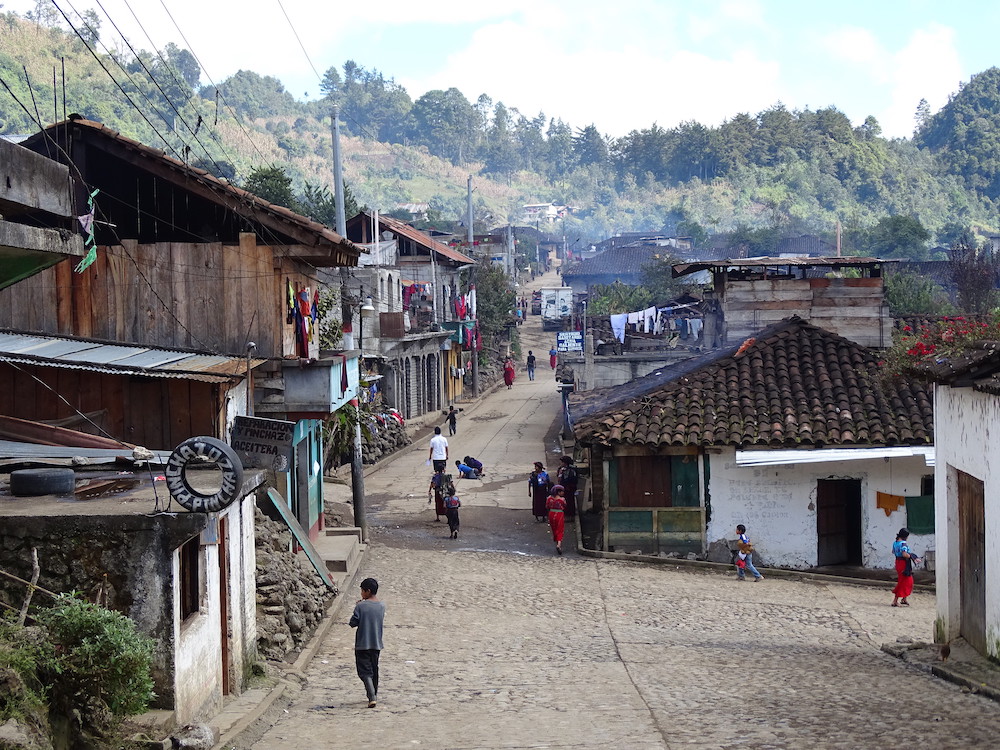
Street scene in Chajul, in the Quiché region of Guatemala, in December 2014. (Flickr/Adam Jones)
What environmental threats do you face?
There currently are various plans [in the Quiché region], some under way and others still on the drawing board. One is to generate electricity using water. There is an invasion of transnational companies going after the water, because despite climate change and global warming, in my territory … there are rivers and mountains, so we have water. The Chixoy hydroelectric dam, one of the largest in Guatemala, is in the north of Quiché.
There are plans for other hydroelectric dams, and the communities have never been consulted. One of the big questions we raise is: Energy for what, and for whom? Where they generate energy, they don't provide electricity to the communities. They take it for large-scale economic projects.
Because the area is mountainous there are also minerals, so there are mining leases. But community organizations opposed them. There were various community consultations, not carried out by the government, but autonomous, and we managed to block many leases. One of the actions to block the mines was in 2010 … and that's when the logging companies moved in. We realized that the government had granted 97 forestry licenses to timber companies.
These are licenses to invade. Since we didn't let the mining companies in, they came with "green capital" plan through REDD+ [reducing emissions from deforestation and forest degradation]. But that is a false green. They plan forestry [plantations] with companies that eliminate ancestral trees like the teun uman pine, which is a tree very specific to Quiché.
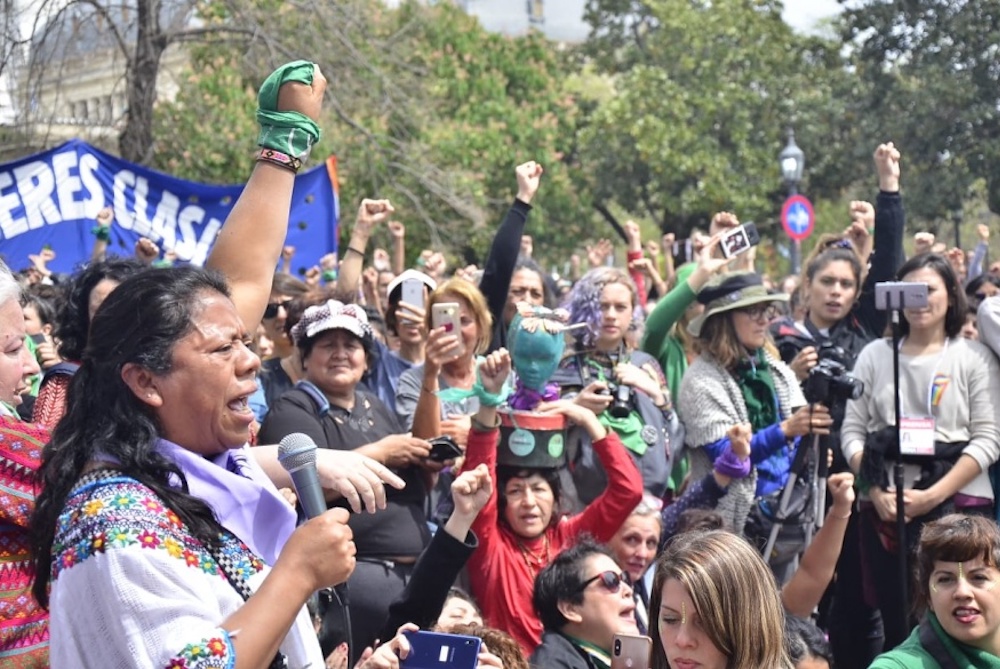
Aura Lolita Chávez Ixcaquic, left, speaks at a rally. (Courtesy Council of K'iche Peoples)
In what ways do you still feel the effects of the war?
The war had various consequences. One was being stripped of our land. The Maya people have always had our land plundered. There have been forced displacements, and the lands remain in the hands of the oligarchy. The big problem in Guatemala is that most of the land is in the hands of just a few families. That is one of the great consequences of the war: We have little land.
Another is the socioeconomic situation. If you made a map analyzing where the greatest poverty is, it would be where there was more war, more massacres. That relationship has a great deal to do with the extermination plans. In Guatemala there was genocide. And the socioeconomic effects are very marked. There isn't good education. Young people don't have access to art or sports. It's not like they say internationally, that we're "forgotten". We're not "forgotten peoples." We are "hated." The government hates us because we defend our life through our organization.
How have women organized to defend the environment?
At first, we didn't call ourselves defenders. Later we began to understand that being a defender brought international support. We welcome mechanisms such as treaties, declarations by the United Nations and the U.N. special rapporteurs.
We didn't know that we were defenders. We had to seek that [status] because [it helped] us ask for help as we were trying to survive threats, stigmatization and defamation. They have slandered me, they've called me a guerrilla. They have stigmatized me a lot.
So we analyzed the situation and we organized … not just in the council, [but also] through networks. We women supported each other, because if we didn't, sometimes, the community would not help us. Communities are more likely to recognize men as authorities, because of the machista system. They don't recognize us. And we have to live with the consequences — the attacks on our families, separation from our sons and daughters, rape. Attacks on women are different from attacks on men.
So we got together and organized with national and international networks. That has been a great inspiration: despite being attacked, we have hope that, if we're organized and networked, we will live. And that is a great hope.
Advertisement
Do the networks of women defenders include other Central American countries?
We are united by our histories, ways of life and experiences. … Companies have regional and continental interests and plans. There are recurrent patterns of attack. The [powerful] families in Honduras, for example, have ties with the [oligarchic] families in Guatemala, and the families who are behind the attacks communicate with each other. The military [leaders] in El Salvador, Mexico and Guatemala communicate with each other.
The aggressors, those who perpetuate violence, are common to us all: the military, the banks, the drug traffickers. So we women have to be in constant and precise communication, to save lives. We unite not only because we have common agendas and similar situations, but because we need to have regional strategies [and take] urgent action. We need to be able to denounce and demand justice, because otherwise, they'll kill us.
Is the Catholic Church supportive of your work?
More than the Catholic Church as an institution, I would rather speak of a community organization of faith tied to the hope of a decent life. Organized communities and parishes, at the grassroots where the hostile situation really exists, where we're in disputed territory — that's where we find allies in faith groups. … I would speak of the grassroots, the work of faith, of organization, of respect for the land, for the sacred.
That is what unites us. And the people, pastors and congregations, we join together as one, because if we don't join together, they'll kill them [the church workers] and they'll kill us. … The Catholic Church has a very deep history among my people. The Church was also the refuge for people who were persecuted during the war. … When we had to flee our territories, the church's human mobility ministry saved many lives.
What can non-Indigenous people learn from your people's way of life?
We have the right to live in a territory that for us is sacred. We create a bond of reverence with the water, with the four elements, for example. If only [others] would have that connection, we'd have a great deal for which to thank humanity. If only every day, when we get up, we recognized that we are water, we are earth, we are fire and we are air, that we are in a web of life that is connected with other communities. That we, humanity, are not the center of power, the center of importance in life, but there are other communities that also coexist, and we must listen to them.
When we say that the plants speak, the trees speak, the stones speak, the mountains speak, it's because we listen to them. What we ask of humanity is that we all listen to the voices of the land, the air, the water. They are talking, and we need to listen to them so we can continue to coexist and to live together.
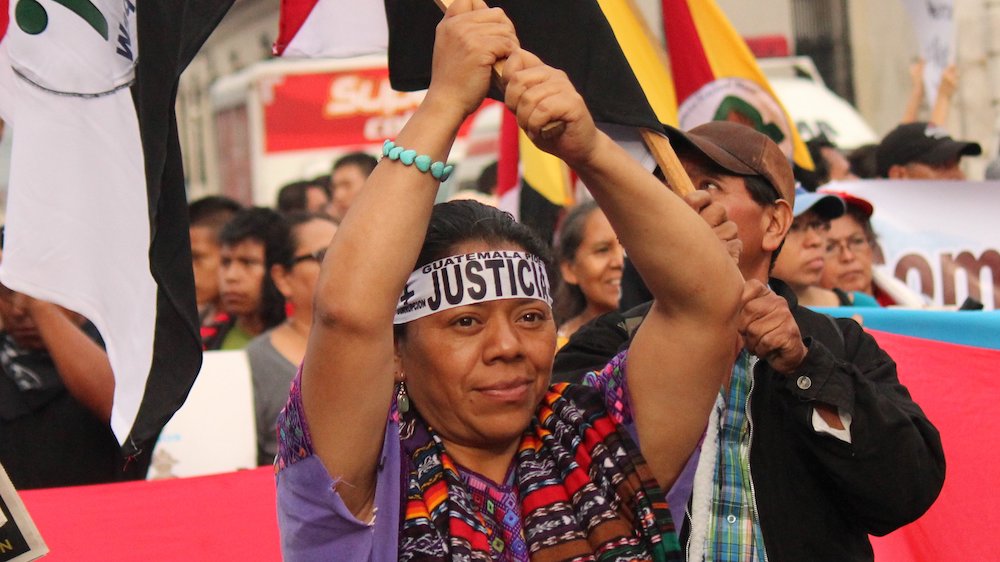
Aura Lolita Chávez Ixcaquic: "It's not like they say internationally, that we're 'forgotten.' We're not 'forgotten peoples.' We are 'hated.' The government hates us because we defend our life through our organization." (Courtesy Council of K'iche Peoples)




